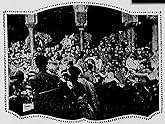A woman pretends to fall in love with two brothers, sowing fatal discord between them, in revenge for the ruin of her own family.A woman pretends to fall in love with two brothers, sowing fatal discord between them, in revenge for the ruin of her own family.A woman pretends to fall in love with two brothers, sowing fatal discord between them, in revenge for the ruin of her own family.
Photos
- Directors
- Writers
- All cast & crew
- Production, box office & more at IMDbPro
Storyline
Did you know
- TriviaAdapted from the director's father's 1908 stage tragedy of the same title.
- ConnectionsEdited into Film ist a Girl & a Gun (2009)
Featured review
"La Nave" (The Ship, 1921) is an Italian historical drama directed by Gabriellino D'Annunzio and Mario Roncoroni. Of these two, Roncoroni was the more prolific director, with 29 directorial works as opposed to D'Annunzio's 5. Neither continued directing after the 1920's. The film is based on a play (1908) written by Gabriele D'Annunzio, Gabriellino's father. The production-company that made the film Ambrosio-Zanotta was not a long-standing one: they made only four films, all in 1921.
The choice of time period is an interesting one. There are tons of films, both Italian and American, set in the glory days of the Roman Empire. This takes place afterwards, in Venice during the 6th century. This is a time of chaos, fighting and misery among the poor, as well as the richer. It is a revenge narrative between two families, centered around the female lead Basiliola, played by the famous Russian ballerina Ida Rubinstein in her only major film appearance. Always a good sign when the lead-actress has never acted in the medium of film, right?
Well, apparently during the chaos, fighting and misery of the 6th century there was also ballet. The tonal differences of the film very quickly grow to haunt it, as dancing really doesn't go with the more gruesome imagery depicted here. The directors have a tough time telling the narrative in a comprehensive way, and there was a tad too much reading, instead of narrating with images.
That is not to say that the film doesn't sport a unique visual look. It absolutely does. But it's mostly a very ugly look to be honest. This is not a historical period where the viewer wishes to remain any longer than absolutely necessary, and because the character work is a bit thin, the epoch is the most memorable thing in the film. The film was badly received upon release, and hasn't gained a following subsequently, even if it offers a rare glimpse in Rubinstein's work. Italians made dozens of historical epics during the silent years, and there are much better ones out there.
The choice of time period is an interesting one. There are tons of films, both Italian and American, set in the glory days of the Roman Empire. This takes place afterwards, in Venice during the 6th century. This is a time of chaos, fighting and misery among the poor, as well as the richer. It is a revenge narrative between two families, centered around the female lead Basiliola, played by the famous Russian ballerina Ida Rubinstein in her only major film appearance. Always a good sign when the lead-actress has never acted in the medium of film, right?
Well, apparently during the chaos, fighting and misery of the 6th century there was also ballet. The tonal differences of the film very quickly grow to haunt it, as dancing really doesn't go with the more gruesome imagery depicted here. The directors have a tough time telling the narrative in a comprehensive way, and there was a tad too much reading, instead of narrating with images.
That is not to say that the film doesn't sport a unique visual look. It absolutely does. But it's mostly a very ugly look to be honest. This is not a historical period where the viewer wishes to remain any longer than absolutely necessary, and because the character work is a bit thin, the epoch is the most memorable thing in the film. The film was badly received upon release, and hasn't gained a following subsequently, even if it offers a rare glimpse in Rubinstein's work. Italians made dozens of historical epics during the silent years, and there are much better ones out there.
- topitimo-829-270459
- May 18, 2020
- Permalink
Details
- Release date
- Country of origin
- Language
- Also known as
- The Ship
- Production company
- See more company credits at IMDbPro
- Color
- Sound mix
- Aspect ratio
- 1.33 : 1
Contribute to this page
Suggest an edit or add missing content






